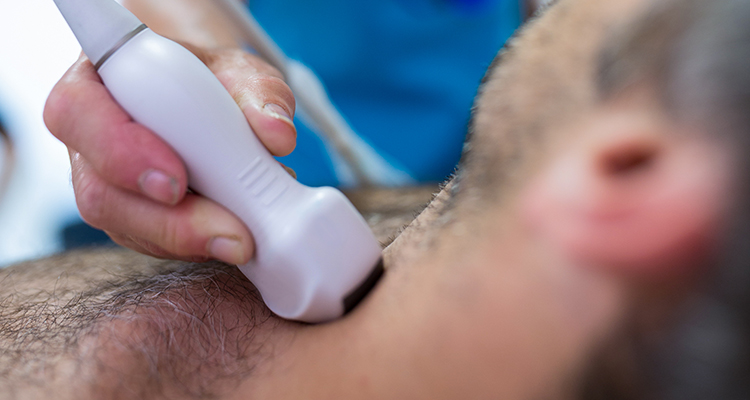How Your Thyroid Impacts Sleep Quality and What You Can Do About It
When people use the phrase, “small but mighty”, maybe they’re talking about the thyroid. While small, this butterfly-shaped gland has a very important job to do in your body. It’s responsible for releasing and controlling the hormones that control your body’s metabolism. Your metabolism processes food, turning it into the energy your body needs to function efficiently. This energy is also used to fuel all of your body’s essential systems. Without it, people experience a myriad of health complications.

There are two common thyroid conditions that can negatively impact your overall health, including your sleep quality — an underactive or overactive thyroid. Here we’ll take a closer look at both conditions and what they mean for achieving quality, restorative sleep, while also exploring insomnia treatment options.
Content
Underactive Vs. Overactive Thyroid Disease
When your thyroid is functioning properly, you feel energetic, focused, and happy. Your body functions at optimum levels, with everything working together promoting balanced physical and mental wellbeing. Located at the base of your neck (in the front), your thyroid controls your heart rate, muscles, brain function, metabolism, and digestion. It’s also responsible for healthy skin, nails, and hair growth.

Both an underactive or overactive thyroid can cause health complications, which may include sleep disturbances.
Underactive Thyroid
As the name suggests, if you have an underactive thyroid it means this important gland isn’t producing enough thyroid hormones to support your body’s basic functions. This condition is also known as hypothyroidism and is characterized by a disruption in body temperature, heart rate, and metabolic function. Older women are at the greatest risk of hypothyroidism although studies show 5 out of 100 people over the age of 12 suffer from this condition.
Symptoms include:
- Constipation
- Dry skin
- Sensitivity to cold
- Fatigue
- Weight gain
- Mood swings
- Lethargy
Individuals with an underactive thyroid are also at greater risk of developing certain sleep disorders like hypersomnia. Hypersomnia is the overwhelming desire to sleep or lapsing into sleep periodically throughout the day. While other medical conditions can cause this serious sleep disorder, hypothyroidism is considered the leading cause due to its effect on the body’s endocrine system. Your endocrine system acts as a messenger inside your body, sending feedback from released hormones directly to your circulatory system. It also regulates the signals being sent to specific organs.
Gone untreated, hypothyroidism is sometimes mistaken for another sleep-related condition known as hypoventilation. This occurs when your breathing is shallow or slow while sleeping. Sleep apnea is a similar, equally serious, sleep disorder that may stem from hypothyroidism.
In addition to these serious sleep disorders, the common side effects of an underactive thyroid can trigger sleep disturbances of their own. Sensitivity to cold, mood swings, and increased joint pain and sensitivity can make it difficult to fall and stay asleep for some people. Other sleep troubles associated with an underactive thyroid include longer sleep onset, poor sleep quality, and shorter sleep duration. Treatment includes hormone supplements and hormone therapy.
Overactive Thyroid
On the other end of the spectrum is hyperthyroidism, or an overactive thyroid, which occurs when your thyroid produces too much of the hormone. This condition affects 1 in 100 people, causing a variety of symptoms including:
- Anxiety/Nervousness
- Hyperactivity
- Muscle aches and weakness
- Mood swings
- Difficulty falling and staying asleep
- Sensitivity to heat
- Excessive fatigue
- Increased thirst
- Itchiness
Because this condition causes excess energy in most people, in addition to anxiety and hyperactivity, it can be difficult to quiet your mind and body enough for sleep. Some people experience nervous energy that borders on irritability, triggering nightmares and paranoia. Increased sensitivity to heat is also a common side effect of hyperthyroidism, resulting in night sweats and frequent awakenings. The constant urge to urinate can also wake you several times throughout the night.
If you already suffer from anxiety or depression, hyperthyroidism can worsen these issues, making it increasingly difficult to achieve quality sleep. Treatment usually involves medication and in some cases, surgery. If your thyroid is enlarged, doctors may recommend removing a large portion of the gland to reduce how much of the thyroid hormone is produced and released into your body.
Other Side Effects of Thyroid Disease
Both hyperthyroidism and hypothyroidism fall under the umbrella of thyroid diseases and can cause other sleep-related problems.
For example, thyroid disease may be a predisposing factor for RLS in some people. Some patients diagnosed with thyroid disease report feeling uncomfortable, tingling sensations in their legs. These unpleasant feelings increase when at rest and at night. RLS is a leading cause of insomnia, as symptoms worsen significantly at night and most people report falling asleep as “nearly impossible”. Even if you manage to fall asleep, an overwhelming urge to move your legs may wake you several times during the night. RLS can lead to daytime impairments and significant sleep loss. While research is still ongoing, scientists attribute this connection to how the thyroid hormone affects muscle weakness, function, and pain receptors.
While rare, some individuals with hyperthyroidism also experience a parasomnia sleep disorder known as night terrors. Worse than nightmares, these episodes are characterized by sudden outbursts during the night that include screaming, flailing while still asleep, sleepwalking, and intense fear. It’s believed that hyperactivity and an overactive mind may trigger these disturbing events.
What Causes Thyroid Disease and Who’s At Risk?
Your body’s internal sleep-wake cycle (circadian rhythm) plays a crucial role in how well you sleep, including how quickly you fall asleep, the quality of your sleep, and how long you stay asleep. This internal clock is regulated by a part of the brain called the suprachiasmatic nucleus, or SCN which is located in your brain’s hypothalamus.

The SCN releases hormones that promote healthy bodily functions and maintain balance within the body. One such function is your sleep-wake cycle. The SCN releases a hormone known as thyrotropin which then triggers your thyroid to release its own hormones. An overactive or underactive thyroid may interfere with the SCN’s release of thyrotropin, which will, in turn, interfere with your body’s circadian rhythm. This can trigger a myriad of sleep disturbances and disorders, including insomnia.
Most thyroid issues are caused by an underlying autoimmune disorder that causes your immune system to attack healthy body cells. Certain autoimmune disorders like Graves’ disease can cause hyperthyroidism, whereas diseases like Hashimoto’s disease may be responsible for an underactive thyroid. Conditions including type 1 diabetes can increase your risk of developing either of these thyroid diseases.
Certain lifestyle choices, including your sleep habits and routine, can also make you more susceptible to developing thyroid disease. For example, individuals who sleep fewer than 7 hours per night are at greater risk of developing hyperthyroidism. On the other hand, people who sleep 8 hours or more are at risk of both an overactive or underactive thyroid. A healthy immune system plays a key role in warding off thyroid disease. Compromised or weak immune systems increase your risk significantly. It’s also interesting to note that getting adequate sleep is one way to support a strong immune system.
While diet alone isn’t responsible for developing thyroid disease, the amount of iodine you ingest does play a role in the overall health and function of your thyroid. That’s because the thyroid gland uses iodine to trigger hormone production. Not enough iodine could slow down this process, whereas too much may cause your thyroid to produce too much of the hormone.
Pregnant women are also more susceptible to thyroid issues. Regardless of your thyroid health prior to becoming pregnant, pregnancy can trigger your thyroid to produce too much or too little of the essential hormones you and your baby need for healthy development. That’s why doctors closely monitor hormone levels throughout your pregnancy. This is especially important for women with pre-existing thyroid conditions. Thyroid disease triggered by pregnancy may persist up to 12 months after giving birth.
Diagnosing Thyroid Disease
In addition to recognizing the common symptoms associated with thyroid disease, there are other ways to diagnose this condition. In most cases, a simple blood test is all it takes to determine if you have an overactive or underactive thyroid.

Those with hypothyroidism are often given a supplement to increase hormone levels. As you age and your hormone levels change and fluctuate, your prescription may also need adjusting. Stay in constant communication with your doctor in regard to how you’re feeling and if the medication dosage is still effective. Things like menopause and your menstrual cycle can interfere with the medication’s effectiveness.
For those with hyperthyroidism, you may need to take radioactive iodine to shrink your thyroid gland. Your doctor can also recommend anti-thyroid medications to stop your body from producing too much thyroid hormone. While beta-blockers don’t regulate hormone levels, they’re often used to help ease hyperthyroid symptoms. Pregnant women, those with pre-existing thyroid issues, or people who can’t take thyroid medication may need surgery to remove part of the gland.
In most cases, living with thyroid disease is done using a mix of medications and lifestyle changes. It’s also important to recognize what behaviors and habits can exacerbate symptoms, including sleep disturbances. Because thyroid disease can negatively affect your body’s sleep-wake cycle, adopting healthy sleep habits is one way to combat these symptoms.
Let’s take a look at some other ways you can achieve quality sleep despite your thyroid issues.
Sleep Tips for Thyroid Disease Patients
The first step in living with thyroid disease is getting a proper medical diagnosis. Once you know what you’re up against, you can start making small lifestyle changes that will have a big impact on your sleep quality.

Set a Sleep Schedule
The best way to maintain a balanced sleep-wake cycle is to set a sleep schedule and stick to it. This involves going to bed at night and waking up at the same time every morning. At night, set a bedtime and try to stay within one hour of it. For the morning, set your alarm at the same time every day. This includes weekends, while on vacation, or other days off. The more consistent your sleep schedule is the faster you’ll establish a healthy sleep-wake cycle. Before long, you may find yourself waking up without the need for an alarm and getting tired at the same time each night. Setting a sleep schedule is an effective way to combat insomnia caused by a hormone imbalance like thyroid disease.
Follow a Sleep Routine
While establishing a set bedtime is important for combating insomnia caused by thyroid disease, all of the habits and behaviors you perform leading up to sleep are equally important. Swap your digital device for a book or journal. The blue light from screens like your smartphone or television prevents your brain from releasing the sleep hormone melatonin. By turning off these devices 60 minutes before bedtime, you’re signaling your brain and body that it’s time to prepare for sleep. Other relaxing and ritualistic behaviors like meditating, reading poetry, or drinking a soothing cup of tea can help ease anxiety and nervousness triggered by hyperthyroidism and lessen the frequency of mood swings experienced by those with hypothyroidism.
Maintain a Healthy Lifestyle
Adopt a balanced diet that includes all the vitamins and nutrients your body needs to function properly. Iodine-rich foods like fish and dairy products can help maintain healthy thyroid levels and prevent sleep disturbances. While some individuals with thyroid disease experience weight gain, opting for healthy, low-calorie foods can keep this to a minimum.
Exercising can not only combat insomnia symptoms but also promote a healthy weight and ease both stress and anxiety associated with thyroid disease. For those with hyperthyroidism, physical activity is a great way to burn off some of that excess energy. Try working out early in the morning. This is said to promote a better night’s sleep by helping you fall asleep faster and sleep more deeply.
Consider ditching unhealthy habits like drinking alcohol in excess or smoking cigarettes. While neither is associated with thyroid disease, both of these unhealthy habits can increase insomnia symptoms and may trigger additional health issues.
Reduce Stress
Not only are stress, anxiety, and mood swings associated with thyroid disease but they’re also some of the leading causes of insomnia. By reducing your stress levels and easing anxiety symptoms, you can maintain a more balanced mood and promote quality sleep. Stress-reducing activities like meditation, mindfulness, and yoga are all effective at reducing negative thoughts and reducing racing thoughts, made worse by certain types of thyroid disease.
Create an Oasis for Sleep
They say your body is your temple. Well, so is your bedroom. Your bedroom should be an oasis for sleep. Make it as comfortable, relaxing, and welcoming as possible.
For those facing thyroid disease, maintaining the right temperature is key. Individuals with hypothyroidism are often colder at night. Dress in appropriate pajamas and keep an extra blanket nearby. Avoid turning up the thermostat too high or using a heated blanket as this may have adverse effects, causing you to wake up sweating and uncomfortable. On the other hand, those with hyperthyroidism tend to overheat at night. Similar to women facing menopausal hot flashes, night sweats can keep you up at night. Try wearing lightweight pajamas and using a thin blanket or sheet while sleeping. Keep your room cool using an overhead fan. The optimum temperature for sleeping is 65 degrees Fahrenheit (18.3 degrees Celsius), although you may need to adjust this if you’re feeling sensitive to hot or cold.
Eliminate outside distractions by investing in a sound machine and room darkening shades. Keep the colors in your room muted and avoid decorations that are overstimulating or “busy”. Help your brain associate your bed with sleep and sex only by avoiding other activities in bed like eating, working, or watching television. Instead, perform one of the stress-reducing activities mentioned above or something else off your sleep routine list until you feel tired enough to go to sleep.
Don’t Let Thyroid Disease Disrupt Your Sleep Any Longer
Thyroid disease affects nearly 20 million people. Whether you’re faced with an overactive or underactive thyroid, the side effects can be troubling. From mood swings and anxiety to muscle aches and insomnia, thyroid disease can make it difficult to feel and function normally. The good news is, with a proper diagnosis and medication, you can rediscover your normal self once again — including achieving restorative sleep.

Understanding and accepting your sleep troubles is step one. Next, you can start to make minor lifestyle changes and find a therapy option that works best for your unique needs. The experienced team of professionals at Somnus Therapy can help you overcome your sleep troubles and reclaim your life, all from the comfort of your own home.













